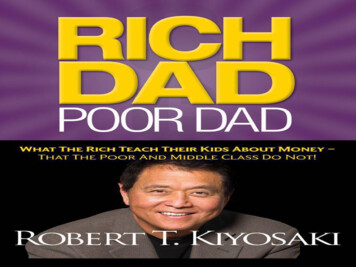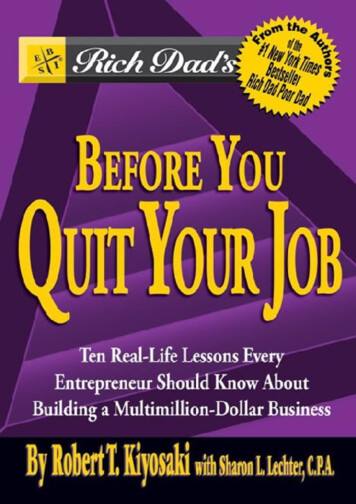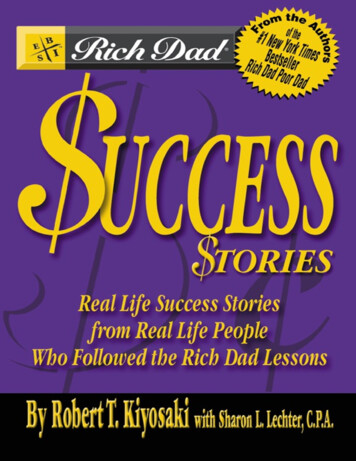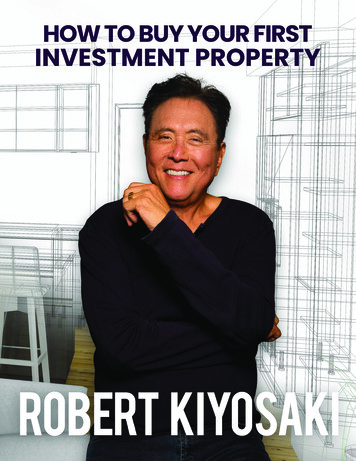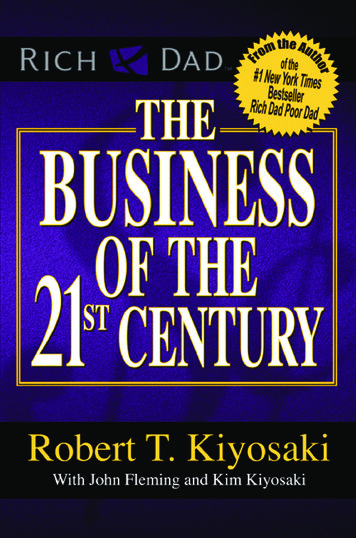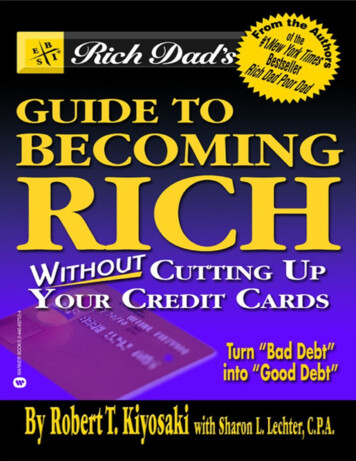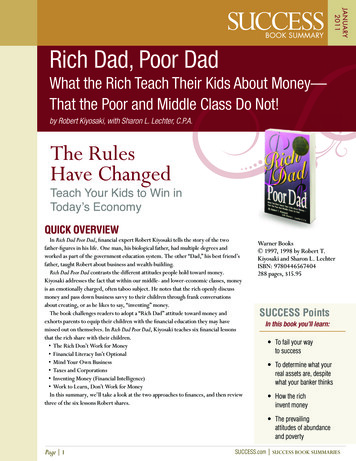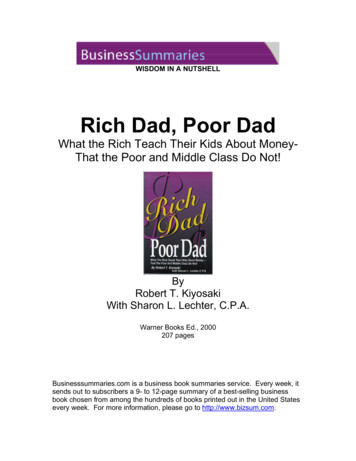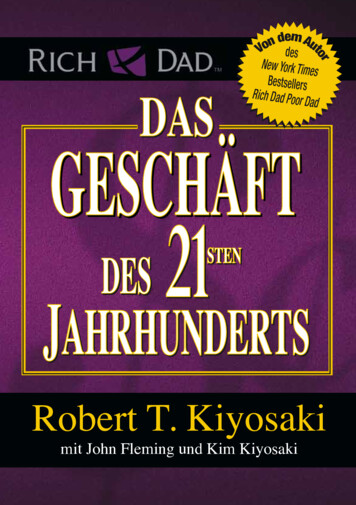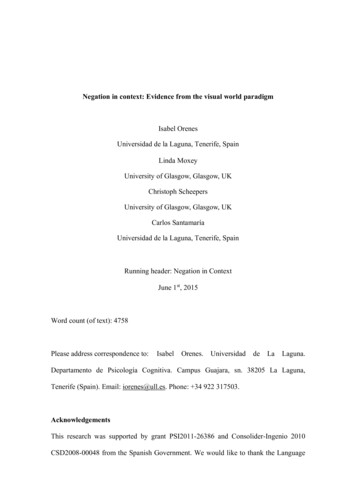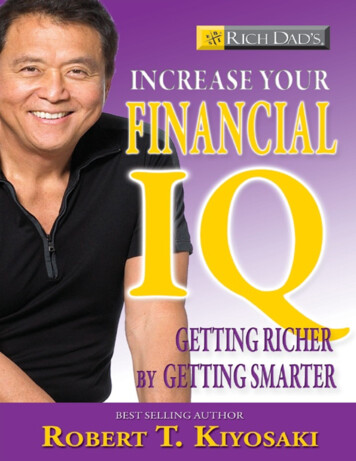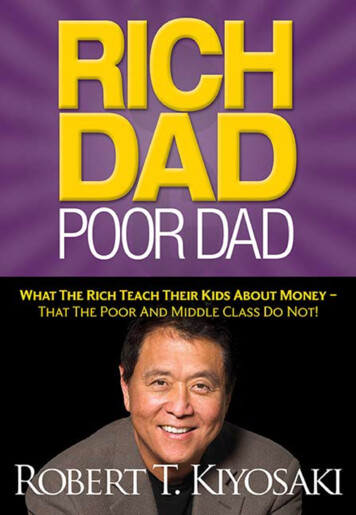
Transcription
“Rich Dad Poor Dad is a starting point for anyone looking togain control of their financial future.”– USA TODAY
RICHDADPOOR DADWhat The Rich Teach Their Kids About Money—That The Poor And Middle Class Do Not!By Robert T. Kiyosaki
If you purchase this book without a cover, or purchase a PDF, jpg, or tiff copy of this book,it is likely stolen property or a counterfeit. In that case, neither the authors, the publisher,nor any of their employees or agents has received any payment for the copy. Furthermore,counterfeiting is a known avenue of financial support for organized crime and terroristgroups. We urge you to please not purchase any such copy and to report any instance ofsomeone selling such copies to Plata Publishing LLC.This publication is designed to provide competent and reliable information regarding thesubject matter covered. However, it is sold with the understanding that the author andpublisher are not engaged in rendering legal, financial, or other professional advice. Lawsand practices often vary from state to state and country to country and if legal or otherexpert assistance is required, the services of a professional should be sought. The author andpublisher specifically disclaim any liability that is incurred from the use or application ofthe contents of this book.Copyright 2011 by CASHFLOW Technologies, Inc. All rights reserved. Except aspermitted under the U.S. Copyright Act of 1976, no part of this publication may be reproduced, distributed, or transmitted in any form or by any means or stored in adatabase or retrieval system, without the prior written permission of the publisher.Published by Plata Publishing, LLCCASHFLOW, Rich Dad, Rich Dad Advisors, ESBI, and are registered trademarks ofCASHFLOW Technologies, Inc.E Bare registered trademarks ofCASHFLOWTechnologies, Inc.S IPlata Publishing, LLC4330 N. Civic Center PlazaSuite 100Scottsdale, AZ 85251(480) 998-6971Visit our websites: PlataPublishing.com and RichDad.comPrinted in the United States of AmericaFirst Edition: 1997First Plata Publishing Edition: March 2011032014ISBN: 978-1-61268-000-2Cover photo credit: Seymour & Brody Studio
RICHDADPOOR DADWhat The Rich Teach Their Kids About Money—That The Poor And Middle Class Do Not!By Robert T. Kiyosaki
Best-selling Booksby Robert T. KiyosakiRich Dad Poor DadWhat the Rich Teach Their Kids About Money –That the Poor and Middle Class Do NotRich Dad’s CASHFLOW QuadrantGuide to Financial FreedomRich Dad’s Guide to InvestingWhat the Rich Invest in That the Poor and Middle Class Do NotRich Dad’s Rich Kid Smart KidGive Your Child a Financial Head StartRich Dad’s Retire Young Retire RichHow to Get Rich and Stay RichRich Dad’s ProphecyWhy the Biggest Stock Market Crash in History Is Still Coming And How You Can Prepare Yourself and Profit from It!Rich Dad’s Success StoriesReal-Life Success Stories from Real-Life PeopleWho Followed the Rich Dad LessonsRich Dad’s Guide to Becoming RichWithout Cutting Up Your Credit CardsTurn Bad Debt into Good DebtRich Dad’s Who Took My Money?Why Slow Investors Lose and Fast Money Wins!Rich Dad Poor Dad for TeensThe Secrets About Money – That You Don’t Learn In School!Escape the Rat RaceLearn How Money Works and Become a Rich KidRich Dad’s Before You Quit Your JobTen Real-Life Lessons Every Entrepreneur Should KnowAbout Building a Multimillion-Dollar BusinessRich Dad’s Increase Your Financial IQGet Smarter with Your MoneyRobert Kiyosaki’s Conspiracy of the RichThe 8 New Rules of MoneyUnfair AdvantageThe Power of Financial EducationWhy “A” Students Work for “C” StudentsRich Dad’s Guide to Financial Education for Parents
To parents everywhere,a child’s first and most important teachers,and to all those who educate, influence,and lead by exampleix
AcknowledgmentsHow does a person say “thank you” when there are so many peopleto thank? Obviously this book is a thank you to my two fathers, whowere powerful role models, and to my mom, who taught me loveand kindness.The person most responsible for this book becoming a reality is mywife Kim—my partner in marriage, business, and in life. She makes mylife complete.xi
ContentsIntroductionRich Dad Poor Dad.1Chapter OneLesson 1: The Rich Don’t Work for Money.9Chapter TwoLesson 2: Why Teach Financial Literacy?.41Chapter ThreeLesson 3: Mind Your Own Business.71Chapter FourLesson 4: The History of Taxes and the Power of Corporations. 79Chapter FiveLesson 5: The Rich Invent Money.91Chapter SixLesson 6: Work to Learn—Don’t Work for Money.115Chapter SevenOvercoming Obstacles.129Chapter EightGetting Started .145Chapter NineStill Want More? Here Are Some To Do’s.167Final Thoughts.173
IntroductionRICH DAD POOR DADHaving two dads offered me the choice ofcontrasting points of view:one of a rich man and one of a poor man.I had two fathers, a rich one and a poor one. One was highlyeducated and intelligent. He had a Ph.D. and completed four yearsof undergraduate work in less than two years. He then went on toStanford University, the University of Chicago, and NorthwesternUniversity to do his advanced studies, all on full financial scholarships.The other father never finished the eighth grade.Both men were successful in their careers, working hard all theirlives. Both earned substantial incomes. Yet one always struggledfinancially. The other would become one of the richest men inHawaii. One died leaving tens of millions of dollars to his family,charities, and his church. The other left bills to be paid.Both men were strong, charismatic, and influential. Both menoffered me advice, but they did not advise the same things. Both menbelieved strongly in education but did not recommend the same courseof study.If I had had only one dad, I would have had to accept or reject hisadvice. Having two dads offered me the choice of contrasting pointsof view: one of a rich man and one of a poor man.Instead of simply accepting or rejecting one or the other, I foundmyself thinking more, comparing, and then choosing for myself. Theproblem was that the rich man was not rich yet, and the poor man1
Introductionwas not yet poor. Both were just starting out on their careers, andboth were struggling with money and families. But they had verydifferent points of view about money.For example, one dad would say, “The love of money is the rootof all evil.” The other said, “The lack of money is the root of all evil.”As a young boy, having two strong fathers both influencing mewas difficult. I wanted to be a good son and listen, but the two fathersdid not say the same things. The contrast in their points of view,particularly about money, was so extreme that I grew curious andintrigued. I began to start thinking for long periods of time aboutwhat each was saying.Much of my private time was spent reflecting, asking myselfquestions such as, “Why does he say that?” and then asking the samequestion of the other dad’s statement. It would have been mucheasier to simply say, “Yeah, he’s right. I agree with that.” Or to simplyreject the point of view by saying, “The old man doesn’t know whathe’s talking about.” Instead, having two dads whom I loved forcedme to think and ultimately choose a way of thinking for myself. As aprocess, choosing for myself turned out to be much more valuable inthe long run than simply accepting or rejecting a single point of view.One of the reasons the rich get richer, the poor get poorer, andthe middle class struggles in debt is that the subject of money istaught at home, not in school. Most of us learn about money fromour parents. So what can poor parents tell their child about money?They simply say, “Stay in school and study hard.” The child maygraduate with excellent grades, but with a poor person’s financialprogramming and mindset.Sadly, money is not taught in schools. Schools focus on scholasticand professional skills, but not on financial skills. This explains howsmart bankers, doctors, and accountants who earned excellent gradesmay struggle financially all of their lives. Our staggering national debtis due in large part to highly educated politicians and governmentofficials making financial decisions with little or no training in thesubject of money.2
Rich Dad Poor DadToday I often wonder what will soon happen when we havemillions of people who need financial and medical assistance. Theywill be dependent upon their families or the government for financialsupport. What will happen when Medicare and Social Security runout of money? How will a nation survive if teaching children aboutmoney continues to be left to parents—most of whom will be, oralready are, poor?Because I had two influential fathers, I learned from both ofthem. I had to think about each dad’s advice, and in doing so, Igained valuable insight into the power and effect of one’s thoughts onone’s life. For example, one dad had a habit of saying, “I can’t affordit.” The other dad forbade those words to be used. He insisted I ask,“How can I afford it?” One is a statement, and the other is a question.One lets you off the hook, and the other forces you to think. Mysoon-to-be-rich dad would explain that by automatically saying thewords “I can’t afford it,” your brain stops working. By asking thequestion “How can I afford it?” your brain is put to work. He didnot mean that you should buy everything you want. He was fanaticalabout exercising your mind, the most powerful computer in theworld. He’d say, “My brain gets stronger every day because I exerciseit. The stronger it gets, the more money I can make.” He believed thatautomatically saying “I can’t afford it” was a sign of mental laziness.Although both dads worked hard, I noticed that one dad had ahabit of putting his brain to sleep when it came to finances, and theother had a habit of exercising his brain. The long-term result wasthat one dad grew stronger financially, and the other grew weaker. Itis not much different from a person who goes to the gym to exerciseon a regular basis versus someone who sits on the couch watchingtelevision. Proper physical exercise increases your chances for health,and proper mental exercise increases your chances for wealth.My two dads had opposing attitudes and that affected the waythey thought. One dad thought that the rich should pay more intaxes to take care of those less fortunate. The other said, “Taxespunish those who produce and reward those who don’t produce.”3
IntroductionOne dad recommended, “Study hard so you can find a goodcompany to work for.” The other recommended, “Study hard so youcan find a good company to buy.”One dad said, “The reason I’m not rich is because I have youkids.” The other said, “The reason I must be rich is because I haveyou kids.”One encouraged talking about money and business at the dinnertable, while the other forbade the subject of money to be discussedover a meal.One said, “When it comes to money, play it safe. Don’t takerisks.” The other said, “Learn to manage risk.”One believed, “Our home is our largest investment and ourgreatest asset.” The other believed, “My house is a liability, and if yourhouse is your largest investment, you’re in trouble.”Both dads paid their bills on time, yet one paid his bills first whilethe other paid his bills last.One dad believed in a company or the government taking careof you and your needs. He was always concerned about pay raises,retirement plans, medical benefits, sick leave, vacation days, andother perks. He was impressed with two of his uncles who joined themilitary and earned a retirement-and-entitlement package for lifeafter twenty years of active service. He loved the idea of medicalbenefits and PX privileges the military provided its retirees. He alsoloved the tenure system available through the university. The ideaof job protection for life and job benefits seemed more important,at times, than the job. He would often say, “I’ve worked hard for thegovernment, and I’m entitled to these benefits.”The other believed in total financial self-reliance. He spoke outagainst the entitlement mentality and how it created weak and financiallyneedy people. He was emphatic about being financially competent.One dad struggled to save a few dollars. The other createdinvestments. One dad taught me how to write an impressive resuméso I could find a good job. The other taught me how to write strongbusiness and financial plans so I could create jobs.4
Rich Dad Poor DadBeing a product of two strong dads allowed me the luxury ofobserving the effects different thoughts have on one’s life. I noticedthat people really do shape their lives through their thoughts.For example, my poor dad always said, “I’ll never be rich.” Andthat prophecy became reality. My rich dad, on the other hand, alwaysreferred to himself as rich. He would say things like, “I’m a rich man,and rich people don’t do this.” Even when he was flat broke after amajor financial setback, he continued to refer to himself as a rich man.He would cover himself by saying, “There is a difference betweenbeing poor and being broke. Broke is temporary. Poor is eternal.”My poor dad would say, “I’m not interested in money,” or“Money doesn’t matter.” My rich dad always said, “Money is power.”The power of our thoughts may never be measured or appreciated,but it became obvious to me as a young boy that it was important to beaware of my thoughts and how I expressedThere is a difference myself. I noticed that my poor dad wasbetween being poor poor, not because of the amount of moneyand being broke.he earned, which was significant, butBroke is temporary. because of his thoughts and actions. As ayoung boy having two fathers, I becamePoor is eternal.acutely aware of being careful about whichthoughts I chose to adopt as my own. Should I listen to my rich dad or tomy poor dad?Although both men had tremendous respect for education andlearning, they disagreed about what they thought was important tolearn. One wanted me to study hard, earn a degree, and get a good jobto earn money. He wanted me to study to become a professional, anattorney or an accountant, and to go to business school for my MBA.The other encouraged me to study to be rich, to understand howmoney works, and to learn how to have it work for me. “I don’t workfor money!” were words he would repeat over and over. “Money worksfor me!”At the age of nine, I decided to listen to and learn from my richdad about money. In doing so, I chose not to listen to my poor dad,even though he was the one with all the college degrees.5
IntroductionA Lesson from Robert FrostRobert Frost is my favorite poet. Although I love many of his poems, myfavorite is “The Road Not Taken.” I use its lesson almost daily.The Road Not TakenTwo roads diverged in a yellow wood,And sorry I could not travel bothAnd be one traveler, long I stoodAnd looked down one as far as I couldTo where it bent in the undergrowth;Then took the other, as just as fair,And having perhaps the better claim,Because it was grassy and wanted wearThough as for that the passing thereHad worn them really about the same,And both that morning equally layIn leaves no step had trodden black.Oh, I kept the first for another day!Yet knowing how way leads onto way,I doubted if I should ever come back.I shall be telling this with a sighSomewhere ages and ages hence;Two roads diverged in a wood, and I—I took the one less traveled by,And that has made all the difference.6
Rich Dad Poor DadAnd that has made all the difference.Over the years, I have often reflected upon Robert Frost’s poem.Choosing not to listen to my highly educated dad’s advice and attitudeabout money was a painful decision, but it was a decision that shapedthe rest of my life.Once I made up my mind about whom to listen to, my educationabout money began. My rich dad taught me over a period of 30 yearsuntil I was 39 years old. He stopped once he realized that I knew and fullyunderstood what he had been trying to drum into my often-thick skull.Money is one form of power. But what is more powerful is financialeducation. Money comes and goes, but if you have the education abouthow money works, you gain power over it and can begin building wealth.The reason positive thinking alone does not work is because most peoplewent to school and never learned how money works, so they spend theirlives working for money.Because I was only nine years old when I started, the lessons my richdad taught me were simple. And when it was all said and done, therewere only six main lessons, repeated over 30 years. This book is aboutthose six lessons, put as simply as possible, just as simply as my rich dadput forth those lessons to me. The lessons are meant not to be answers,but guideposts that will assist you and your children to grow wealthierno matter what happens in a world of increasing change and uncertainty.7
Chapter OneLESSON 1: THE RICH DON'TWORK FOR MONEYThe poor and the middle class work for money.The rich have money work for them.“Dad, can you tell me how to get rich?”My dad put down the evening paper. “Why do you want to getrich, Son?”“Because today Jimmy’s mom drove up in their new Cadillac, andthey were going to their beach house for the weekend. He took threeof his friends, but Mike and I weren’t invited. They told us we weren’tinvited because we were poor kids.”“They did?” my dad asked incredulously.“Yeah, they did,” I replied in a hurt tone.My dad silently shook his head, pushed his glasses up the bridge of hisnose, and went back to reading the paper. I stood waiting for an answer.The year was 1956. I was nine years old. By some twist of fate,I attended the same public school where the rich people sent theirkids. We were primarily a sugar-plantation town. The managers ofthe plantation and the other affluent people, such as doctors, businessowners, and bankers, sent their children to this elementary school.After grade six, their children were generally sent off to privateschools. Because my family lived on one side of the street, I wentto this school. Had I lived on the other side of the street, I would9
Chapter One: Lesson 1have gone to a different school with kids from families more likemine. After grade six, these kids and I would go on to the publicintermediate and high school. There was no private school for themor for me.My dad finally put down the paper. I could tell he was thinking.“Well, Son ,” he began slowly. “If you want to be rich, you haveto learn to make money.”“How do I make money?” I asked.“Well, use your head, Son,” he said, smiling. Even then I knewthat really meant, “That’s all I’m going to tell you,” or “I don’t knowthe answer, so don’t embarrass me.”A Partnership Is FormedThe next morning, I told my best friend, Mike, what my dad hadsaid. As best as I could tell, Mike and I were the only poor kids in thisschool. Mike was also in this school by a twist of fate. Someone haddrawn a jog in the line for the school district, and we wound up inschool with the rich kids. We weren’t really poor, but we felt as if wewere because all the other boys had new baseball gloves, new bicycles,new everything.Mom and Dad provided us with the basics, like food, shelter,and clothes. But that was about it. My dad used to say, “If you wantsomething, work for it.” We wanted things, but there was not muchwork available for nine-year-old boys.“So what do we do to make money?” Mike asked.“I don’t know,” I said. “But do you want to be my partner?”He agreed, and so on that Saturday morning, Mike became myfirst business partner. We spent all morning coming up with ideason how to make money. Occasionally we talked about all the “coolguys” at Jimmy’s beach house having fun. It hurt a little, but that hurtwas good, because it inspired us to keep thinking of a way to makemoney. Finally, that afternoon, a bolt of lightning struck. It was anidea Mike got from a science book he had read. Excitedly, we shookhands, and the partnership now had a business.10
Rich Dad Poor DadFor the next several weeks, Mike and I ran around our neighborhood,knocking on doors and asking our neighbors if they would save theirtoothpaste tubes for us. With puzzled looks, most adults consented with asmile. Some asked us what we were doing, to which we replied, “We can’ttell you. It’s a business secret.”My mom grew distressed as the weeks wore on. We had selected asite next to her washing machine as the place we would stockpile ourraw materials. In a brown cardboard box that at one time held catsupbottles, our little pile of used toothpaste tubes began to grow.Finally my mom put her foot down. The sight of her neighbors’messy, crumpled, used toothpaste tubes had gotten to her. “What are youboys doing?” she asked. “And I don’t want to hear again that it’s a businesssecret. Do something with this mess, or I’m going to throw it out.”Mike and I pleaded and begged, explaining that we would soonhave enough and then we would begin production. We informed herthat we were waiting on a couple of neighbors to finish their toothpasteso we could have their tubes. Mom granted us a one-week extension.The date to begin production was moved up, and the pressure wason. My first partnership was already being threatened with an evictionnotice by my own mom! It became Mike’s job to tell the neighbors toquickly use up their toothpaste, saying their dentist wanted them tobrush more often anyway. I began to put together the production line.One day my dad drove up with a friend to see two nine-year-oldboys in the driveway with a production line operating at full speed.There was fine white powder everywhere. On a long table were smallmilk cartons from school, and our family’s hibachi grill was glowingwith red-hot coals at maximum heat.Dad walked up cautiously, having to park the car at the base ofthe driveway since the production line blocked the carport. As he andhis friend got closer, they saw a steel pot sitting on top of the coals inwhich the toothpaste tubes were being melted down. In those days,toothpaste did not come in plastic tubes. The tubes were made oflead. So once the paint was burned off, the tubes were dropped in thesmall steel pot. They melted until they became liquid, and with my11
Chapter One: Lesson 1mom’s pot holders, we poured the lead through a small hole in thetop of the milk cartons.The milk cartons were filled with plaster of paris. White powderwas everywhere. In my haste, I had knocked the bag over, and theentire area looked like it had been hit by a snowstorm. The milkcartons were the outer containers for plaster of paris molds.My dad and his friend watched as we carefully poured the moltenlead through a small hole in the top of the plaster of paris cube.“Careful,” my dad said.I nodded without looking up.Finally, once the pouring was through, I put the steel pot downand smiled at my dad.“What are you boys doing?” he asked with a cautious smile.“We’re doing what you told me to do. We’re going to be rich,”I said.“Yup,” said Mike, grinning and nodding his head. “We’re partners.”“And what is in those plaster molds?” my dad asked.“Watch,” I said. “This should be a good batch.”With a small hammer, I tapped at the seal that divided the cubein half. Cautiously, I pulled up the top half of the plaster mold and alead nickel fell out.“Oh, no!” my dad exclaimed. “You’re casting nickels out of lead!”“That’s right,” Mike said. “We’re doing as you told us to do. We’remaking money.”My dad’s friend turned and burst into laughter. My dad smiledand shook his head. Along with a fire and a box of spent toothpastetubes, in front of him were two little boys covered with white dustsmiling from ear to ear.He asked us to put everything down and sit with him on the frontstep of our house. With a smile, he gently explained what the word“counterfeiting” meant.Our dreams were dashed. “You mean this is illegal?” asked Mikein a quivering voice.12
Rich Dad Poor Dad“Let them go,” my dad’s friend said. “They might be developing anatural talent.”My dad glared at him.“Yes, it is illegal,” my dad said gently. “But you boys have showngreat creativity and original thought. Keep going. I’m really proudof you!”Disappointed, Mike and I sat in silence for about twenty minutesbefore we began cleaning up our mess. The business was over onopening day. Sweeping the powder up, I looked at Mike and said,“I guess Jimmy and his friends are right. We are poor.”My father was just leaving as I said that. “Boys,” he said. “You’reonly poor if you give up. The most important thing is that you didsomething. Most people only talk and dream of getting rich. You’vedone something. I’m very proud of the two of you. I will say it again:Keep going. Don’t quit.”Mike and I stood there in silence. They were nice words, but westill did not know what to do.“So how come you’re not rich, Dad?” I asked.“Because I chose to be a schoolteacher. Schoolteachers really don’tthink about being rich. We just like to teach. I wish I could help you,but I really don’t know how to make money.”Mike and I turned and continued our cleanup.“I know,” said my dad. “If you boys want to learn how to berich, don’t ask me. Talk to your dad, Mike.”“My dad?” asked Mike with a scrunched-up face.“Yeah, your dad,” repeated my dad with a smile. “Your dadand I have the same banker, and he raves about your father. He’stold me several times that your father is brilliant when it comes tomaking money.”“My dad?” Mike asked again in disbelief. “Then how come wedon’t have a nice car and a nice house like the rich kids at school?”“A nice car and a nice house don’t necessarily mean you’re rich oryou know how to make money,” my dad replied. “Jimmy’s dad works for13
Chapter One: Lesson 1the sugar plantation. He’s not much different from me. He works for acompany, and I work for the government. The company buys the car forhim. The sugar company is in financial trouble, and Jimmy’s dad maysoon have nothing. Your dad is different, Mike. He seems to be buildingan empire, and I suspect in a few years he will be a very rich man.”With that, Mike and I got excited again. With new vigor, we begancleaning up the mess caused by our now-defunct first business. As wewere cleaning, we made plans for how and when to talk to Mike’s dad.The problem was that Mike’s dad worked long hours and often did notcome home until late. His father owned warehouses, a constructioncompany, a chain of stores, and three restaurants. It was the restaurantsthat kept him out late.Mike caught the bus home after we had finished cleaning up. Hewas going to talk to his dad when he got home that night and ask himif he would teach us how to become rich. Mike promised to call as soonas he had talked to his dad, even if it was late.The phone rang at 8:30 p.m.“Okay,” I said. “Next Saturday.” I put the phone down. Mike’s dadhad agreed to meet with us.On Saturday I caught the 7:30 a.m. bus to the poor side of town.The Lessons BeginMike and I met with his dad that morning at eight o’clock. Hewas already busy, having been at work for more than an hour. Hisconstruction supervisor was just leaving in his pickup truck as I walkedup to his simple, small, and tidy home. Mike met me at the door.“Dad’s on the phone, and he said to wait on the back porch,”Mike said as he opened the door.The old wooden floor creaked as I stepped across the threshold ofthe aging house. There was a cheap mat just inside the door. The matwas there to hide the years of wear from countless footsteps that thefloor had supported. Although clean, it needed to be replaced.I felt claustrophobic as I entered the narrow living room thatwas filled with old musty overstuffed furniture that today would becollectors’ items. Sitting on the couch were two women, both a little14
Rich Dad Poor Dadolder than my mom. Across from the women sat a man in workman’sclothes. He wore khaki slacks and a khaki shirt, neatly pressed butwithout starch, and polished work boots. He was about 10 years olderthan my dad. They smiled as Mike and I walked past them toward theback porch. I smiled back shyly.“Who are those people?” I asked.“Oh, they work for my dad. The older man runs his warehouses,and the women are the managers of the restaurants. And as youarrived, you saw the construction supervisor who is working on aroad project about 50 miles from here. His other supervisor, who isbuilding a track of houses, left before you got here.”“Does this go on all the time?” I asked.“Not always, but quite often,” said Mike, smiling as he pulled upa chair to sit down next to me.“I asked my dad if he would teach us to make money,” Mike said.“Oh, and what did he say to that?” I asked with cautious curiosity.“Well, he had a funny look on his face at first, and then he said hewould make us an offer.”“Oh,” I said, rocking my chair back against the wall. I sat thereperched on two rear legs of the chair.Mike did the same thing.“Do you know what the offer is?” I asked.“No, but we’ll soon find out.”Suddenly, Mike’s dad burst through the rickety screen door andonto the porch. Mike and I jumped to our feet, not out of respect,but because we were startled.“Ready, boys?” he asked as he pulled up a chair to sit down with us.We nodded our heads as we pulled our chairs away from the wallto sit in front of him.He was a big man, about six feet tall and 200 pounds. My dad wastaller, about the same w
Rich Dad Poor Dad What the Rich Teach Their Kids About Money - That the Poor and Middle Class Do Not Rich Dad's CASHFLOW Quadrant Guide to Financial Freedom Rich Dad's Guide to Investing What the Rich Invest in That the Poor and Middle Class Do Not Rich Dad's Rich Kid Smart Kid Give Your Child a Financial Head Start Rich Dad's Retire .
